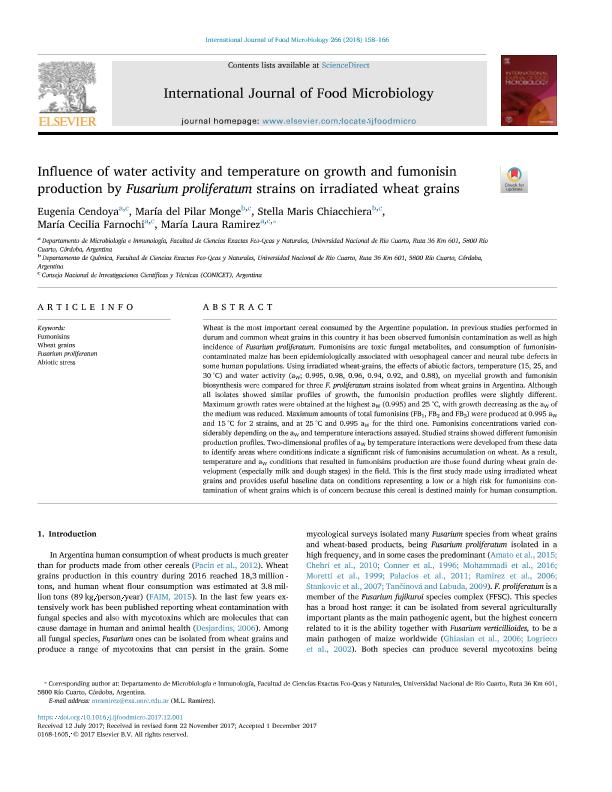Artículo
Influence of water activity and temperature on growth and fumonisin production by Fusarium proliferatum strains on irradiated wheat grains
Cendoya, Eugenia ; Monge, Maria del Pilar
; Monge, Maria del Pilar ; Chiacchiera, Stella Maris
; Chiacchiera, Stella Maris ; Farnochi, Maria Cecilia; Ramirez, Maria Laura
; Farnochi, Maria Cecilia; Ramirez, Maria Laura
 ; Monge, Maria del Pilar
; Monge, Maria del Pilar ; Chiacchiera, Stella Maris
; Chiacchiera, Stella Maris ; Farnochi, Maria Cecilia; Ramirez, Maria Laura
; Farnochi, Maria Cecilia; Ramirez, Maria Laura
Fecha de publicación:
02/02/2018
Editorial:
Elsevier Science
Revista:
International Journal of Food Microbiology
ISSN:
0168-1605
Idioma:
Inglés
Tipo de recurso:
Artículo publicado
Clasificación temática:
Resumen
Wheat is the most important cereal consumed by the Argentine population. In previous studies performed in durum and common wheat grains in this country it has been observed fumonisin contamination as well as high incidence of Fusarium proliferatum. Fumonisins are toxic fungal metabolites, and consumption of fumonisin-contaminated maize has been epidemiologically associated with oesophageal cancer and neural tube defects in some human populations. Using irradiated wheat-grains, the effects of abiotic factors, temperature (15, 25, and 30 °C) and water activity (aW; 0.995, 0.98, 0.96, 0.94, 0.92, and 0.88), on mycelial growth and fumonisin biosynthesis were compared for three F. proliferatum strains isolated from wheat grains in Argentina. Although all isolates showed similar profiles of growth, the fumonisin production profiles were slightly different. Maximum growth rates were obtained at the highest aW (0.995) and 25 °C, with growth decreasing as the aW of the medium was reduced. Maximum amounts of total fumonisins (FB1, FB2 and FB3) were produced at 0.995 aW and 15 °C for 2 strains, and at 25 °C and 0.995 aW for the third one. Fumonisins concentrations varied considerably depending on the aW and temperature interactions assayed. Studied strains showed different fumonisin production profiles. Two-dimensional profiles of aW by temperature interactions were developed from these data to identify areas where conditions indicate a significant risk of fumonisins accumulation on wheat. As a result, temperature and aW conditions that resulted in fumonisins production are those found during wheat grain development (especially milk and dough stages) in the field. This is the first study made using irradiated wheat grains and provides useful baseline data on conditions representing a low or a high risk for fumonisins contamination of wheat grains which is of concern because this cereal is destined mainly for human consumption.
Palabras clave:
ABIOTIC STRESS
,
FUMONISINS
,
FUSARIUM PROLIFERATUM
,
WHEAT GRAINS
Archivos asociados
Licencia
Identificadores
Colecciones
Articulos(CCT - CORDOBA)
Articulos de CTRO.CIENTIFICO TECNOL.CONICET - CORDOBA
Articulos de CTRO.CIENTIFICO TECNOL.CONICET - CORDOBA
Articulos(CCT - NOA SUR)
Articulos de CTRO.CIENTIFICO TECNOL.CONICET - NOA SUR
Articulos de CTRO.CIENTIFICO TECNOL.CONICET - NOA SUR
Citación
Cendoya, Eugenia; Monge, Maria del Pilar; Chiacchiera, Stella Maris; Farnochi, Maria Cecilia; Ramirez, Maria Laura; Influence of water activity and temperature on growth and fumonisin production by Fusarium proliferatum strains on irradiated wheat grains; Elsevier Science; International Journal of Food Microbiology; 266; 2-2-2018; 158-166
Compartir
Altmétricas



